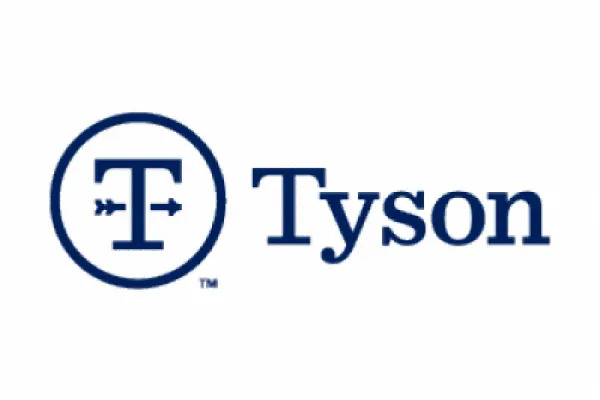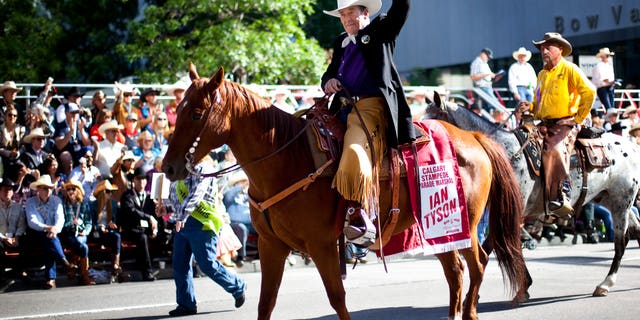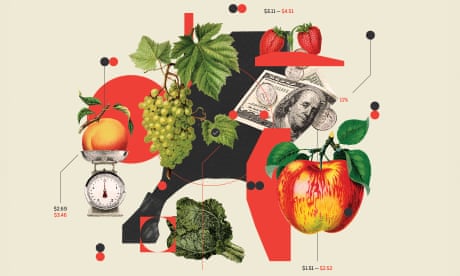
"Screw You, Lakeside Workers"
Cowboy Ralphy, gunslinger for Tyson's
You know you are in trouble when not one but two influential Sun columnists expose the fact that King Ralph and his cronies are on the side of the devil, in this case American Meat Packing Monopoly Tysons, and the workers are on the side of the Angels.
It's not often in a labour dispute anywhere, let alone right wing Alberta, that UFCW has the support of the right wing Sun newspaper chain. Let alone its outspoken columnists like the normally trenchant neo-conservative Neil Waugh or Rick Bell. And they tell it like it is. Let alone two columnists in two major cities that usually never see eye to eye on anything, amazing. Waugh and Bell take on Ralph and sound like Mother Jones, like the workers, they are Mad As Hell.
Looks like Ralph and the boys blew this one big time...especially with the Human Resources Minister claiming to take a hands off approach to this strike, except of course to sic his Labour Relations Board puppies on the workers, while leaving Tysons free to make a bad situation worse with their scabbing.
Which as of today they have temporarily stopped, having shut down the Brooks plant operation for the weekend. And if the strike succeeds Tyson said it may have to divert cattle to U.S. plants in Washington state and Idaho if it cannot run the Alberta plant. It's called whipsawing, threatening to leave to pressure the government. And these guys would do it to with all that cool Alberta Government cash in their pockets.
And I am not the only one who has called on the union to ignore the Labour Relations Board ruling. Something Rotten at the Alberta Labor Relations BoardThis isn't just a strike forced on the largely immigrant workforce at Lakeside Packers by Tyson's but by Ralph's gang in the Legislature, with the quiet support of their Federal Counterparts the Harper Conservatives.
Since this is Conservative MP Monte Solbergs riding, and he was off in Las Vegas as all hell broke loose at Lakeside Packers this week. When he finally blogged today it was about using whale oil as an alternative fuel...yep he praised whale hunting while ignoring the mess Tyson's has made in his riding. Talk about being out of touch. Well he is in good company.
Ralph ducks By RICK BELL, CALGARY SUN, Thursday, October 13 Doug O'Halloran, the union president, makes a last effort to persuade the man of the people. Doug asks Ralph to "require the parties to submit their differences to the process of binding arbitration. Leadership demands a balancing of everyone's interests." Of course, Doug knows the bitter truth. Tyson doesn't want a deal because Tyson doesn't want a union. And Tyson runs Ralph -- not the other way around.
Ouch, and it just gets better.....

From hero to zero
Ralph goes from prosperity popularity to part of Tory-concocted strike at BrooksBy NEIL WAUGH, EDMONTON SUN, Thursday, Oct. 13
An aloof and disconnected provincial Tory government, a made-for-TV labour dispute which pits downtrodden workers against a big, bad meat packer. And a premier surrounded by B-team cabinet ministers who freeze up like a Lada at 40 below. Add an even more ironic twist - unlike the politically naive Don Getty who spent most of his dismal time in the premier's office hiding out from Albertans - Ralph Klein has finally rediscovered his populism (through his $400 rebate cheques) after three years of political drifting. Even though the suits blasted him. Finance Minister Shirley McClellan announced details of Ralphbucks on Tuesday, and the premier was a genuine Alberta hero. Less than 24 hours later, Ralph went from hero to zero as the Tory-concocted strike at Lakeside Packers began. A skirmish broke out at the plant gate when Arkansas-based Tyson Foods tried to bust the picket line with two buses loaded with "Green Hats" - the name the boys and girls on the line have given plant management. Windows were broken. The buses turned back. Film at six. And a repeat of the images of the 1986 Battle of 66 Street when United Food and Commercial Workers fought with Edmonton police in front of Peter Pocklington's Gainers plant. The PCs already picked winners and losers with Shirley McClellan's deeply-flawed BSE bailout which saw the province's two multinational packers and the big feedlot corporations take most of the millions that was supposed to trickle down to cow/calf operators. Provincial Auditor General Fred (Get 'er) Dunn revealed that packer profits soared 281% after the border was closed to Alberta beef and the mad cow money kicked in. When the border swung open in July, UFCW Local 401 was poised to strike - disrupting the beef trade again. But the Tories struck first, appointing a disputes inquiry board. Union members overwhelmingly accepted the findings. Tyson rejected it almost out of hand. Thus the strike. This week, Local 401 boss Doug O'Halloran tried to appeal to the province's newly resurrected No. 1 People Person. In a letter to the preem he talked about the other side of Klein's Alberta Advantage where "an employer often requires them to work without pay and stand in their own urine." He talked of a "workforce of good and decent, hard-working people. Many are immigrants or transplants from other parts of Canada pursuing the Alberta dream," Doug informed Ralph. In 1989, Edmontonians were so turned off by Getty's handling of the Gainers strike that they drove the Tories from the capital. Don lost his seat.
And better........
Unequal fight-This is a case in which Goliath is backed up by government By RICK BELL, CALGARY SUN, Friday October 14 This is a strike where the provincial government still sits on its butt watching all hell begin to break loose. This day Tyson acts as they do every day, knowing they hold all the cards worth holding. They have all the economic edge, some it gained piling up profits during our mad cow mess while pocketing $32.9 million from the Alberta taxpayer in mad cow aid. They hold all the legal advantages. Alberta, unlike most other provinces, doesn't have a system in place for imposing a settlement when a union bargains for its first contract and the workers cannot get an agreement. The province's Labour Relations Board is ... how shall I say this tactfully ... company-friendly. Tyson wants the provincial board to tell the workers to step aside and let buses run into the plant while limiting the number of pickets. Bingo. Meanwhile, Ralph and the boys in Edmonton do what Tyson wants. Tyson wants this strike called off in the summer. The province calls it off. Tyson rejects a deal worked out by the province's own appointee, an agreement overwhelmingly accepted by the union. No problem. Tyson doesn't want the province to get involved as they did in July. Done. Mr. Tyson, what else would you like us to fetch?
And then Neil Waugh exposes the real reason for Tysons forcing the strike....The yankees are robbing the bank of Alberta with profits from government subsidies to support their operations south of the border and oh yes Don Tysons lavish lifestyle, which he failed to report to share holder or the SEC.....
Strange bedfellows By Neil Waugh, Edmonton Sun, Fri, October 14, 2005 Tyson was a major winner in former agriculture minister Shirley McClellan's BSE bingo when the U.S. border was closed to Alberta beef.The workers on the line now believe that the 60-day strike delay forced by the Tories was intended to allow Tyson to get its ducks in a row to break the union. The company summarily rejected the compromise offer that the government's mediator negotiated. But even more disturbing is the loan document filed with the SEC on Sept. 28 while the Alberta Tories were going through their mediation charade. It revealed an unsecured three-year loan agreement for Lakeside Farm Industries (the holding company for Tyson's Brooks plant and adjacent feedlot) for $352.9 million. It's guaranteed by Tyson and would appear to require a serious chunk of cash flow to service. Maybe that's why Ralph's new American friends are so reluctant to give an inch on a union contract when Lakeside not only appears to be a cash cow, but a valuable asset to raise money.Then there's the April 28 "settled enforcement" with the SEC where former chairman and current director Don Tyson and the company agreed to pay $2.2 million US for "misleading disclosures" over Don's benefits and perks. The SEC probe found Tyson and his two unidentified cronies ran up $689,016 US in oriental rugs, antiques and London vacations. There was also the boat and mansion at Cabo San Lucas, Mexico. And the house in the English countryside. Plus a whole list of other personal frills including lawn care, maintenance on nine autos and housekeeping at five houses that Tyson shareholders paid for without being properly told about in proxy notices. With friends like these, who needs enemies?
This is a strike by mainly immigrant workers. Both the Alberta and Federal Government agree that we need more immigrant workers.... Migrants needed to bolster workforce: Pettigrew....as it is now it will be to be exploited as cheap labour as the Fraser Institute recomends and Tysons Lakeside Packers is proving in practice.
Alberta needs workers
Alberta will increase immigration and bolster apprentice training to deal with a projected shortfall of more than 100,000 workers over the next decade.
With $107-billion in capital projects on the drawing board, political and industry leaders said Tuesday they want to ensure that the province's red-hot economy continues to roar.
The government plan includes a policy to seek immigrants and help them make the transition to live and work in the province, Economic Development Minister Clint Dunford said.
“Expanding our provincial nominee program will help Alberta employers attract and recruit skilled foreign workers to fill positions that could not be filled across Canada after extensive searching,” Dunford said.
While the labour shortage is most acute in Alberta because of its booming energy sector, including oilsands projects in the Fort McMurray area, other provinces are feeling the pinch for skilled and unskilled workers.
Business groups such as the Canadian Chamber of Commerce have been calling on the federal government to devise a national plan to deal with the problem.
Federal Immigration Minister Joe Volpe has suggested Ottawa may raise Canada's immigration levels by up to 40 per cent over the next five years.
Earlier this year trade unions opposed a government program that brought in temporary foreign workers to help in Alberta's oil sands.
Labour leaders were still a little skeptical Tuesday.
“Is this really about immigrants or helping business get better access to cheap labour?” questioned Gil McGowan, president of the Alberta Federation of Labour.
“We are not convinced the provincial government has done enough to help groups of workers here in Alberta who could be trained to fill some of these trades jobs.”
Immigrants finding jobs in Canada, just not the ones they want
The Tysons battle is the same old battle that all Immigrants to Canada have faced, low wage exploitation, which is why we have unions and why immigrants have been the backbone of Canada's labour movement.
Like the Gainers strike this is a battle of David versus Goliath, and David for once is getting support from Goliath's media buddies.
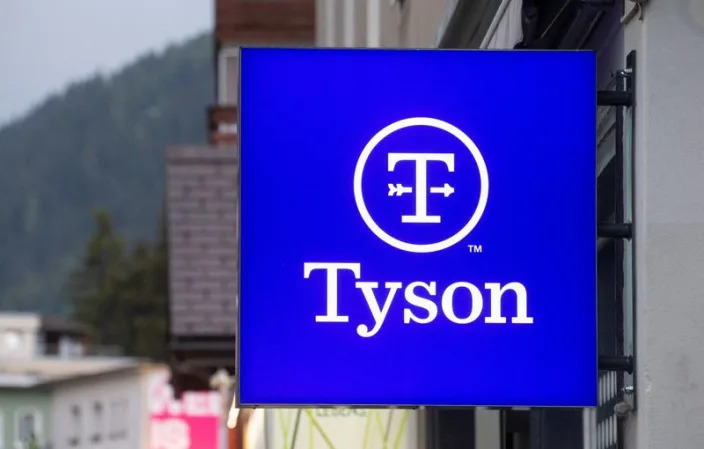
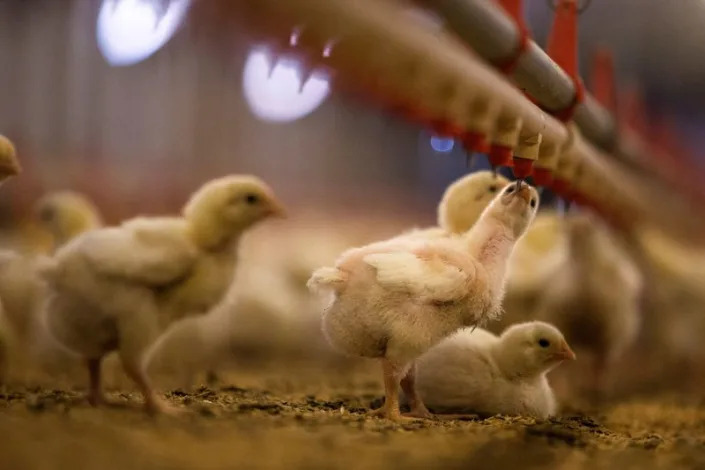
 “
“

